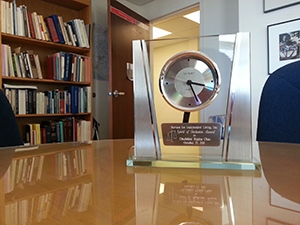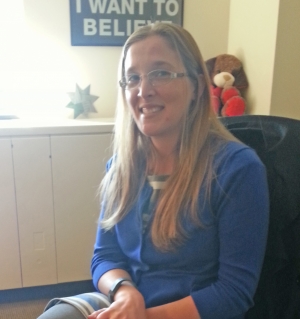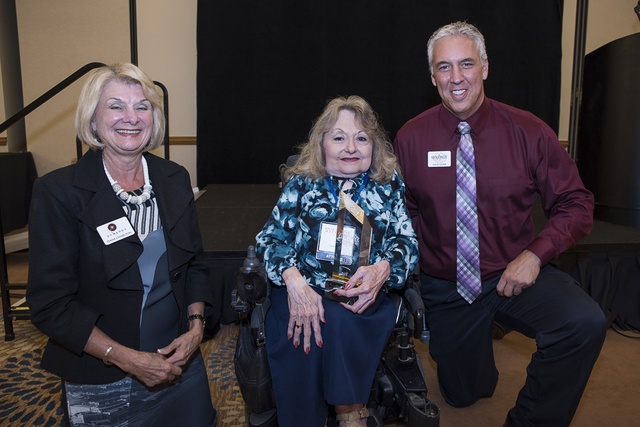News from Disability Rights Ohio is the monthly newsletter from Disability Rights Ohio, providing information and updates about case work and activities of the agency, and other disability-related news.
In This Issue:
- Finding Home: How DRO helped four women fight for their rights to live in the community
- SIL honors DRO with Spirit of Inclusion Award
- DRO’s PAIMI Advisory Council seeks new members
- Disability Rights Ohio Wins Grant Award from Ohio Attorney General's Office to Provide Advocacy Services for Victims of Crime with Disabilities
- Staff Profile: DRO Senior Policy Analyst Danielle Gray works to create better systems
- DRO Board President Sue Willis honored
- Call DRO if your private duty nursing services are being cut, eliminated
- DRO in the News
- Client Advocacy Outcomes
- Help us keep the victories coming! Donate online to Disability Rights Ohio
Finding Home: How DRO helped four women fight for their rights to live in the community

Karyn Berry had lived in Summit County for a long time with her dad, Tom, as her guardian. But as Tom got older, he realized it was getting more and more difficult for him to care for her. He started to talk to his daughter, Kim, about taking over his caretaking duties and moving Karyn, who has developmental disabilities and is non-verbal, down to Marietta to be closer to her sister. First, though, he needed to find a suitable place for Karyn to live.
“I’d been talking to people down there about better housing, and I couldn’t find anything that made me comfortable,” he says. “Eventually, I started talking about buying a house for Karyn and some other people to live in. I’ve been working with Summit Housing for 40 years. They develop and maintain housing for people with disabilities in the Akron area, so I asked them if they ever did any work outside the county. They said, ‘Sure,’ so we looked at some houses and found 206 Pebble Drive. They bought the house, and I donated some money toward it.”
Karyn and three other women with developmental disabilities—Kay, Rose and Abi—were slated to move in on September 1, 2015.
DRO Takes Quick Action
The problems started when Summit began work on some safety features for the house, and the neighbors uncovered that the house was owned by a business and would be a home for people with disabilities. Soon, Summit Housing received letters from Marietta’s law director and a private attorney, suggesting that the plans for the house were in violation of zoning and private deed restrictions.
A public hearing held in early August did not go well, with neighbors making hurtful statements about what they imagined it would be like to live near people with disabilities. Susan Tilton, the Superintendent of the Washington County Board of Developmental Disabilities took action and called Disability Rights Ohio on behalf of the women on Friday, August 21, requesting the agency’s help.
“DRO called the women and their guardians, the DD board and the service providers and made a public records request to the city,” says Kerstin Sjoberg-Witt, DRO’s Director of Advocacy. “Once we’d gathered all of that information, the DRO team believed that stereotypes, fear and discrimination were at work, and that if the city took action to prevent the women from moving into their home this would violate the Fair Housing Act.”
By Monday, August 24, DRO had prepared a letter to the Marietta law director and City Council, citing the Fair Housing Act and requesting that accommodations be made for the women and their home. DRO team members drove to Marietta for a second public hearing on Tuesday, August 25. Representatives from The Arc of Ohio, the DD boards in Summit and Washington Counties, the director of the provider agency, the president of Summit Housing and several supportive members of the community were also in attendance. Sjoberg-Witt was the first to speak when the issue was opened for public comment.
“We wanted to set the tone,” she explains. “I made it clear that 206 Pebble Drive is a home, not a business. The women are going to live there with the services and supports they need. They want to be part of the community. I also held up a copy of the Sixth Circuit court decision about Fair Housing to make it clear that the law is on our side. As people raised questions, I responded and explained. It was really about educating and informing the council and the neighbors.”
At the end of the hearing, the City Council moved to begin with the legislative process, which required three public readings, to grant the reasonable accommodation requested. Karyn, Kay, Rose and Abi moved in on September 1, and the council voted unanimously to approve the reasonable accommodation request on September 17.
Home Sweet Home
Kay takes a walk through the neighborhood with her aide every evening. She’s sure to talk to people, and neighbors have started to greet her and wave.
“I like to talk to people,” she says. “One of the neighbors talked to me, and I really liked that. I want the neighbors to know that I love my new house, and I like to do housework, especially dusting! I also love jewelry and nail polish, and I can watch TV in my bedroom anytime I want.”
“After it all calmed down, I think the neighbors have seen that it’s really not that bad to have people with disabilities in the neighborhood,” reflects Rosie Reed, Kay’s guardian. “Kay feels comfortable there. She doesn’t feel like any of the neighbors are mean to her. And the staff in the house is excellent, taking the girls out to do things and interacting with them.”
Tom Berry thinks breaking down these stereotypes is a matter of education, not just for the neighbors but people throughout the country.
“A lot of people have their ideas about what disabilities are,” he says. “We’ve got to educate them. People with disabilities are human beings, and they have their ups and downs, likes and dislikes just like everyone else. They would like to live just like everyone else.”
When asked if DRO’s help made a difference, Reed has nothing but glowing words.
“I think that DRO’s help made a big difference, coming into the council meeting,” she explains. “I don’t know how it would have turned out otherwise. I think DRO did a wonderful job coming in and explaining what was going to happen. DRO really set a tone that this is bigger than four women on Pebble Drive, this goes back to the Fair Housing Act and civil rights. It made the council take a step back. Without DRO’s help, I think they may have found a way to not let them in.”
Even better, she hears that the council is planning to pursue some grant funding to write a plan to be more proactive about similar situations.
“I think they’ll do things better,” she says. “Because of this, people will be helped in the future.”
SIL honors DRO with Spirit of Inclusion Award

Each year, Services for Independent Living (SIL) in Euclid, Ohio, awards its Spirit of Inclusion Award to an organization, group or individual that has demonstrated a spirit of inclusion for people with disabilities. On October 23, Disability Rights Ohio was honored with this year’s award, which carries special significance because 2015 is both the 25th anniversary of the Americans with Disabilities Act and the 35th anniversary of SIL.
SIL Director of Advocacy Kathy Foley presented the award to DRO Executive Director Michael Kirkman at SIL’s celebration of the 25th anniversary of the Americans with Disabilities Act. Foley spoke of Disability Rights Ohio’s collaborative spirit, highlighting its partnerships with Services for Independent Living and many other disability advocacy groups across the state.
Kirkman expressed appreciation for the award, remarking that the effective collaborations that DRO has built will allow the organization to continue to find innovative ways to advocate for the rights of people with disabilities.
DRO’s PAIMI Advisory Council seeks new members
The Protection and Advocacy for Individuals with Mental Illness (PAIMI) program serves people with mental illness and helps them to understand their human, civil and legal rights to help them advocate for themselves. Under the PAIMI program, DRO also investigates abuse, neglect and rights violations in facilities and in the community.
The PAIMI Advisory Council is a group of people from across the state of Ohio that helps DRO set priorities for the work it does to improve the lives of people with mental illness. Council members also participate in outreach events, trainings and other activities.
DRO is looking for new members of the PAIMI Advisory Council. To find out more, visit the PAIMI Advisory Council page on our website, which includes our new FAQ about the Council and links to the online and PDF versions of the application form.
Disability Rights Ohio wins grant award from Ohio Attorney General's office to provide advocacy services for victims of crime with disabilities
Disability Rights Ohio was recently selected as a new grant award recipient from the Ohio Attorney General's Office, Victims of Crime Grant Program. This important funding will bolster DRO's efforts to support and advocate for individuals with disabilities who are victims of sexual abuse or assault.
As a recent series in the Columbus Dispatch (story 1, story 2, story 3) highlighted, victims with disabilities often face discrimination when they seek justice for sexual abuse or assault due to the false perception that they can't communicate and are not credible witnesses. These stereotypes mean that perpetrators often go unprosecuted. This grant award will allow Disability Rights Ohio to be an independent advocate for people with disabilities and provide them with the advocacy services needed to help them report sexual assault, access appropriate victims' services and seek justice in the criminal justice system.
Disability Rights Ohio is grateful to Ohio Attorney General Mike DeWine for not only awarding funding for this program but also for taking a strong stance to improve crime victim services for people with disabilities and all Ohioans.
"This grant award sends a clear message to the disability community that crimes against people with disabilities should be taken seriously," said DRO Executive Director Michael Kirkman. "We are excited to partner with the Attorney General's Office to strengthen Ohio's ability to ensure that all crime victims are afforded fundamental justice and access to quality, comprehensive services."
Individuals and organizations interested in learning more about DRO's services for crime victims with disabilities can contact DRO at 1-800-282-9181 and select 2 for the Intake Department or by leaving a message on our Facebook page.
Related links:
Columbus Dispatch – Grant to help expand services for developmentally, physically disabled
Staff Profile: DRO Senior Policy Analyst Danielle Gray works to create better systems

During college, while majoring in Philosophy and Political Science, Disability Rights Ohio Senior Policy Analyst Danielle Gray thought she’d go to law school. Then an internship at a law firm made her see that a career in law wasn’t a good fit.
“I came to realize I wanted to work with big questions about how to improve people’s quality of life, so I went to Ohio State for a Master’s in Public Health Policy.”
DRO may not seem like an obvious fit for someone with a background in public health policy, but Gray sees the connection clearly.
“A lot of what we do is work to create systems and policies that allow people to make the best decisions for them, and that’s really what public health is,” she explains. “It’s not just getting people to get flu shots or breastfeed their babies but about creating systems that make it easier to make healthy choices.”
Gray is a part of the team that worked on DRO’s recently awarded $75,000 grant from the Ohio Attorney General’s Victims of Crime Grant Program. The application came out of a report on sexual abuse of individuals with developmental disabilities DRO released in the spring.
“After that report came out, the Ohio Association to End Sexual Violence encouraged us to apply for VOCA funds,” Gray says. “We knew People First of Ohio was already doing amazing work to train self-advocates around the issue of sexual abuse, but there were gaps in the system. People would report their abuse, but nothing would happen. People First didn’t have the capacity or expertise to bridge those gaps, but we do, so we asked for funds to do that work.”
With the additional funds, DRO will be able to help people who identify as a victim report the sexual assault, access appropriate victims' services and seek justice in the criminal justice system. Outreach efforts are focused on Franklin, Knox and Licking counties, but the agency will help anyone in Ohio.
Gray is pleased that it all came together, and she was able to be a part of writing the grant that brought in the funds.
“It’s very rare that you have this confluence of events: we are primed to be able to do this work, and someone has funding to give us to do it. People with disabilities brought this need to us, and we are able to help now. As with everything DRO does, there’s a spirit of everyone’s voice being valued.”
DRO Board President Sue Willis honored

Sue Willis, a founding member of DRO’s board of directors and currently President of the Board, was presented with the Synergy Award at the 2015 Synergy Conference, co-sponsored by PAR and the Ohio Self Determination Association. The Synergy Award honors a person whose work in the disability field “represents the interaction of two or more agents or forces so their combined effect is greater than the sum of their individual effects.” Throughout her career and most recently as head of the AXIS Center for Public Awareness, Sue’s efforts have been to bring people together to advance the cause of people with disabilities. Congratulations to Sue on this well deserved award.
Call DRO if your private duty nursing services are being cut, eliminated
Many people with disabilities need nursing care for a medical condition. People who are enrolled in the Medicaid program can get nursing services in their own homes. With a doctor’s prescription, you can get nursing care on a part-time (or intermittent) basis, which generally means no more than 14 hours a week and visits that last no more than four hours. With approval (called “prior authorization”) from the Ohio Department of Medicaid (“ODM”), you can get private duty nursing (“PDN”) services. These are continuous nursing services that can be more than 14 hours a week and for longer than four hours at a time.
Recently, many people getting PDN services have learned that their services will be reduced or even eliminated. This creates many problems for people and their families and may even be illegal under Medicaid law and the Americans with Disabilities Act (ADA).
Read Disability Rights Ohio's frequently asked questions document about private duty nursing services.
If you need help, call DRO at 800-282-9181 and select option 2 for intake.
Related links:
Columbus Dispatch – Medicaid cuts worry Ohio families
DRO in the News
After working for an average of $2.50 an hour for more than three years, three Disability Rights Ohio (DRO) clients are asking for fair pay from Seneca Re-Ads, a sheltered workshop run by the County Board of Developmental Disabilities in Seneca County. The employees’ work duties include cutting and assembling samples for flooring company Roppe Industries, a private corporation. Through a novel and potentially precedent-setting procedure, the three DRO clients have asked the U.S. Department of Labor (USDOL) to review their claims. The petition, which is supported by the National Federation of the Blind, the Autistic Self Advocacy Network, and the Baltimore law firm of Brown, Goldstein & Levy, LLP, requests that USDOL review the clients’ wages and the means by which the current wages were set. Reporter Lauren Lindstrom of the Toledo Blade wrote about the case.
Toledo Blade - Below-minimum pay for disabled challenged
Client Advocacy Outcomes
DRO attorney provides advocacy for deaf client to receive accommodation
An individual who requested an in-person meeting and an ASL interpreter as accommodations for a meeting with her caseworker was initially denied her request.
The individual contacted Department of Job and Family Services (JFS) to discuss her Medicaid benefits with her case worker. The client requested a face-to-face meeting as well as an ASL interpreter because the client felt much is lost in the translation for her in phone calls. Her request for the accommodation was denied, and she was told JFS does not provide ASL interpreters. The client felt that the caseworker was discriminating against her by requiring her to either talk on the phone or use pen and paper in person.
A disability rights attorney advocated on the client’s behalf, drafting a letter to the caseworker and the director of Franklin County JFS and including additional resources from the Department of Justice regarding the right to effective communication. The attorney also spoke with several individuals at JFS to ensure that the client was provided both an in-person appointment and an ASL interpreter. DRO followed up again when client's appointment was canceled due to a power outage.
The client reported the in-person meeting took place, and an ASL interpreter was provided for the meeting. According to the client, the conversation was quite complex, and she would not have been able to communicate as effectively on the phone or without an interpreter.
---
Student looks to the future after successfully taking LSAT with accommodations
After receiving two denials on requests for accommodations for the Law School Admissions Test (LSAT), an individual finally received all requested accommodations with the assistance of DRO.
The student requested accommodations from the Law School Admissions Council (LSAC) for an LSAT exam and was denied. He appealed but was not granted the full accommodations he required. He contacted DRO for assistance to receive the accommodations recommended by his doctor. A disability rights attorney reviewed the client’s records and made several recommendations to strengthen his request. When he applied again to take the test with accommodations, LSAC agreed to provide all requested accommodations for the LSAT.
The client took the LSAT earlier this month and is awaiting his test scores.
Help us keep the victories coming! Donate online to Disability Rights Ohio
We believe people with disabilities should be allowed to participate in the community and have a say in how they live, just like people who live without a disability. There is always more to do, but we need your help.
Disability Rights Ohio can now accept donations via PayPal. You can find the PayPal button on our Donate page. Please consider making a donation yourself or come up with a creative way to raise money for our cause. Thank you so much for your support!

